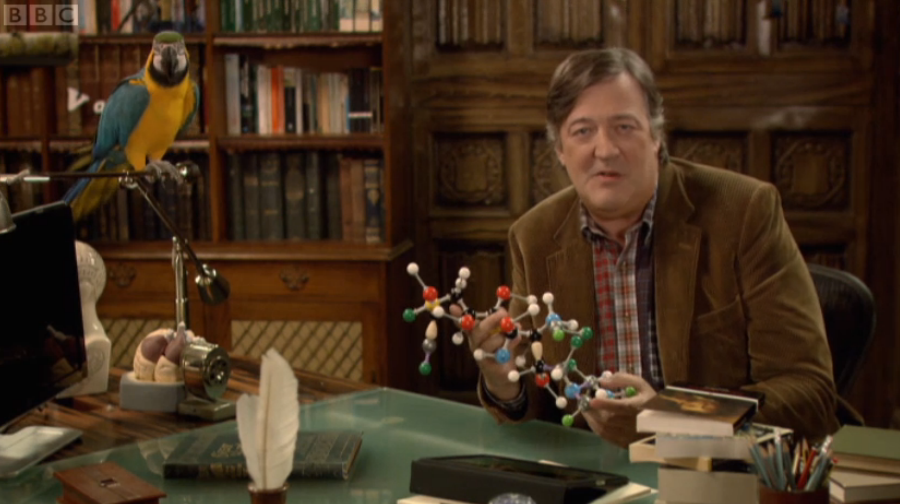Stephen Fry has embarked on a series of documentaries about language, beginning with the evolution of language which he calls ‘the final frontier’ of human understanding. The typical documentary hype is all here: Stephen Pinker sits in a gigantic fish tank with bits of taxidermied brain lying around like sandwiches; Michael Tomasello appears to live in a tropical primate enclose; Fry conducts his studies from a medieval study complete with quills, a CGI tree of languages and a talking parrot.
Despite this, it was actually a coherent and comprehensive review of topics in the field: Language versus communication in animals, phisological constraints of language, creativity and the desire to share information, the pragmatic origins of language, FoxP2 and the poverty of the stimulus. Bilingualism is even added to this cannon of interesting ways to approach the origins of language, somewhat tempered by Fry’s question “wouldn’t it be better if everybody spoke Esperanto?”.
Mercifully, Fry seems to be actually interested rather than trying to build up the conspiracy plot format endemic in other science documentaries. There are some odd diversions to a Klingon version of Hamlet, a trip to a German Christmas market and a slightly awkward re-enactment of a feral child case, but all in all the message is not objectionable: There is a graded difference between non-human and human communication, it’s partly genetic and partly cultural and languages continually change under pressures to be learned and to express new ideas. There are also welcome additions of the original Wug test and, of course, Fry & Laurie’s seminal sketch about language.
Overall, I’d say it was the second best documentary the BBC have made about the origins of language.
Here’s a clip:
Also a clip of Fry talking about the series:


I hope that Stephen Fry will also cover the need for an international language in his BBC 2 series, And that won’t be Klingon! Esperanto however would be a worthy candidate.
Many ignorant people describe Esperanto as “failed” – other ignorant people say that if human beings were meant to fly, God would have given them wings. Esperanto is neither artificial nor a failure however. As the British Government now employs Esperanto translators it has ceased to be a hobby.
The new Esperanto online course http://www.lernu.net has 125 000 hits per day and Esperanto Wikipedia enjoys 400 000 hits per day. That can’t be bad 🙂
I think you mean ‘canon’.
I was looking forward to this but it was so condescending an half-arsed that I had no option but to fall asleep.
Generally you need to switch off half the brain to watch any BBC documentary.
@John Carr: Yes, that’s exactly the kind of mistake Stephen Fry would never make, maybe I should be fired.
Although it wasn’t terribly taxing, at least Fry is asking the right questions in an accessible way. The Horizon documentary made the field look like a clandestine organisation.
Hmm, having seen the documentary again, I was perhaps a bit too kind. Here’s a more rigorous run-down from bad linguistics.
In Planet Word last night the gentlemen in the golf club bar in Connemara might have answered more instructively when asked about the differences in ways of saying things in Irish and English.
Irish is rich in words and expressions that cover personal interaction and attitudes to that interaction. These often suggest the Irish were an ironic people even before they started speaking English.
A short list below is made up of Irish words still used in everyday speech by English speakers in Waterford, the county which has the smallest remaining Irish-speaking area. Most counties have no such area.
Flaithiúlach (pr. ‘flahoolock’) = wilfully, even wastefully, generous;
Gaisce (‘goshka’) = a great deed, as done by an ostentatious do-gooder;
Meas (‘mass’) = regard or esteem based on experience of the subject rather than on affinity, interest or inclination;
Plámás (‘plawmawss’) = soothing flattery designed to bluff, placate or cajole;
Searbhas (‘sharoose’) = a form of dismissiveness derived from the word for bitter (searbh), this is negativity with touches of the ungrateful and defeatist;
Trína chéile (‘treenakayla’) = literally ‘between together’, this means a state of inability to interact with oneself, which is something more than confused.
I recognise some of those words- my family uses ‘Flaithiúlach’ in a fairly disparaging sense.
Perhaps Fry’s thesis (“Language defines us”) does not take into account how much language has adapted to our social needs. Perhaps instead of defining us, language reflects the social actions we find important in the world.
Sean, I’ve remembered two more examples that may be familiar:
ráiméis (‘rawmaysh’): the kind of rambling or raving drivel characterised by the true interest the speaker has in listening to what he or she is saying, drunk or not, senile or not.
cnáimhseáil (‘cnawvshawl’): the complaining done by a whinger, like rubbing bones together (cnámh being the Irish for bone).
A much more rigorous analysis of the second program, by Manuela Rocchi.